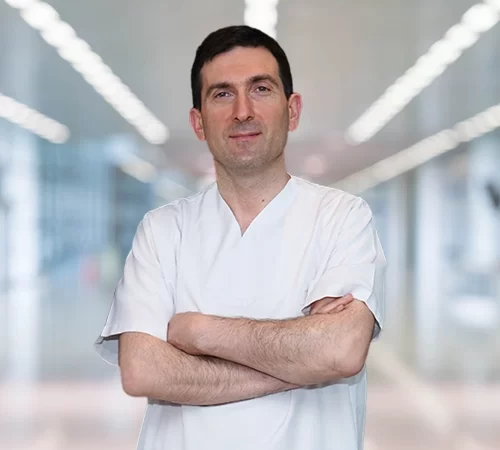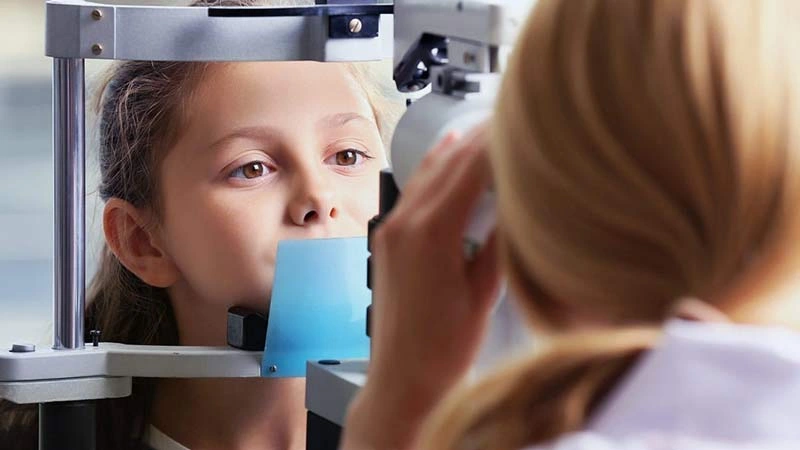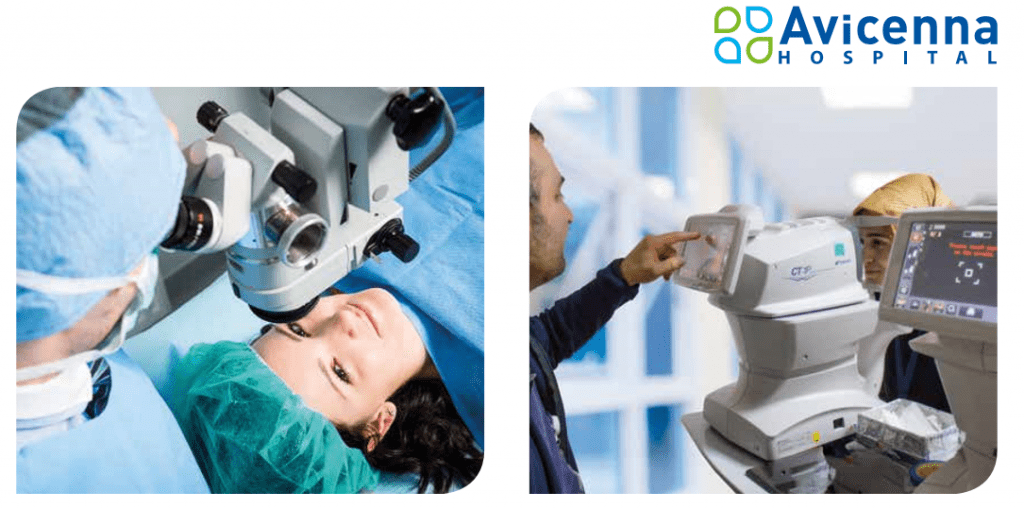The Avicenna Hospitals’ ophthalmology departments are eye care centers with ophthalmologists that specialize in the diagnosis and treatment of all eye diseases.
Eye disease reduces our quality of life considerably. Healthy eyes increase the quality of life. As a result, eye problems should be detected early and treated as soon as possible. Otherwise, permanent problems may occur, which can lead to vision loss. Therefore, everyone should go to hospitals regularly and have routine checkups. This enables the early diagnosis and treatment of potential disorders. Everyone should have an examination at least once a year. If you have any doubts or complaints you can go to the Avicenna International Hospital Ophthalmology medical department and have an eye examination.
Eye Diseases
Eye disorders are conditions that result in deterioration or total loss of vision as a result of genetic, environmental, or aging-related causes. These conditions can have a very significant impact on the patient’s life. Although certain eye illnesses do not initially exhibit any symptoms, the majority of eye disorders can exhibit one or more of the following symptoms: intense burning and itching, reduced or widened vision, difficulty selecting colors, an abundance of burrs, and pain from light.
Eye Disease Symptoms
- If people suspect eye disease, it is useful to examine the symptoms. These diseases come out with certain symptoms.
- If there are problems such as itching, dryness, swelling, bleeding, pain, or tenderness in the core
- If there are problems such as retinal disease, cataract, glaucoma, or keratoconus in the family genetics
- If you have a disease that may affect the eye, such as diabetes or blood pressure disease
- If you have a previous eye surgery
- If you have suffered an injury to the eye area
You should definitely go to an eye doctor. On the other hand, it is of great importance to go to eye examinations regularly and systematically.
Eye Disease Treatment Methods
Since eye diseases directly affect the quality of life, patients need to choose the right doctors who will use the appropriate treatment method. The specialist ophthalmologists of Avicenna Hospital play an active role in the diagnosis and treatment process of all eye diseases. Both congenital problems and diseases that develop later in life have a wide range of treatments today.
Treated Diseases by the Eye Center
Avicenna Hospital Ophthalmology department diagnoses diseases such as cataract – refractive surgery, vitreoretinal diseases, oculoplastic surgery, macular spot, and glaucoma and carries out patient treatment. In this context, research is done on areas including refractive errors, strabismus, premature retinopathy, retinal illnesses, and corneal diseases. Utilizing all available medical advancements, our experienced specialists assist in the diagnosis and treatment of various problems. Ophthalmology Clinics at Avicenna Hospitals provide the following diagnostic and therapeutic services.
Cataract
Cataract, a disease of old age disease, is of great importance both in terms of keeping the eyes healthy and leading a quality life. Cataracts first appear with symptoms such as seeing objects double, blurred vision, and difficulty seeing at night. Later, it continues with the loss of vision ability over time. A cataract is not a disease that individuals can live with or manage the disease. It definitely needs treatment.
On the other hand, it is not possible to treat cataracts with medication and need surgery. Surgery is the only option for treating cataracts. In this case, a qualified surgeon is necessary. Laser technology has become popular in recent years for cataract surgery. Modern medicine is employed in cataract surgery together with extremely advanced technology.
Glaucoma
High intraocular pressure affects the optic nerves, resulting in the condition known as glaucoma, which can eventually result in vision loss. It is challenging to diagnose glaucoma since the majority of patients have no early warning signs or symptoms. Glaucoma risk factors include a family history of the condition, diabetes or goiter disorders in later life, long-term corticosteroid usage, ocular inflammation, myopia, and migraines. In order to detect the condition early on, it is crucial for people in these risk categories to get routine eye examinations and have their intraocular pressure checked on a routine basis. There is no complete cure for glaucoma because it damages the eye’s nerve cells. Instead, therapy aims to keep the condition under control and stop visual loss. Medications that lower intraocular pressure are often used to treat glaucoma, and depending on the kind, surgery or laser therapy may also be utilized.
Strabismus
When the muscles that maintain parallelism between the eyes are incompatible or weak, it impairs ocular synchronization, resulting in strabismus, which can be a chronic condition. Depending on the patient’s age and the severity of the disease, there are a variety of therapy options to treat strabismus. After an eye examination, strabismus can be treated surgically, with specific lenses, with computer-assisted eye exercises, or with personalized glasses.
Refractive surgery
Refractive surgery involves utilizing a surgical procedure rather than glasses or contact lenses to cure visual problems. These problems include myopia, hyperopia, and astigmatism. Following an examination, the doctor selects refractive surgery depending on the person’s vision problems. Refractive surgery has advantages for people who do not have chronic diseases, are older than 18 years old, and have adequate corneal thickness and eye numbers.
Retinal Detachment
Retinal detachment is a serious disease that causes vision loss. It may occur at any age. If not treated urgently, it may cause partial or complete vision loss. Retinal detachment is the separation of the layer of pigment epithelium below the retinal nerve layer. It is most commonly seen in patients with high myopia. Argon laser is essential for the treatment of retinal tears. Early diagnosis and treatment of retinal tears are extremely important. Symptoms of retinal tears are light flashes and flying objects. If these symptoms occur, a retinal check must be done as soon as possible. Vitrectomy surgery is necessary if retinal detachment develops. The surgical method can vary depending on the number of retinal tears that cause retinal detachment, the size, the location, and the length of retinal detachment.
Excimer Laser
Excimer Laser is the surgical method in the treatment of myopia, astigmatism, and hypermetropia. According to the degree of visual impairment, the transparent corneal layer on the eye is reshaped with the Excimer Laser to get a clear vision. What are the treatment methods with Excimer Laser ? 1. PRK-LASEK 2. No-touch laser 3. Femto LASIK (i-LASIK).
Oculoplasty and Blepharoplasty
Oculoplasty involves eyelid and lachrymal duct diseases. Oculoplastic surgery offers a better esthetical appearance for patients and also contributes to better visual function and visual quality. Catheter treatment for congenital duct problems during babyhood era, surgical treatment to improve congenital or acquired lid-drop problems, surgical approaches to lachrymal duct problems (dacryocystorhinostomy), blepharochalasis, surgeries for eyelid ectropion and entropion, surgeries for eyelid shape dysfunctions, eyelid tumor surgeries, surgeries to solve the problems sourcing from eyelashes.
Macular Degeneration
Macular degeneration occurs as a result of aging. It is a slowly progressive disease. it may be seen as a black area in the middle of the visual field with a loss of vision. Smoking, genetic predisposition, and unhealthy eating habits are risk factors for macular degeneration.
Decreasing visual acuity, seeing the lines as skewed, and black spots in the middle of the center of vision are the beginning symptoms of this disease Treatment of Macular Degeneration For the treatment of a dry type of macular degeneration, preventive treatment, Such as Anti-oxidant A, C, E vitamins, lutein, and zinc are used. For the treatment of wet type intraocular injections are used. During this application, the patient does not feel any pain.





